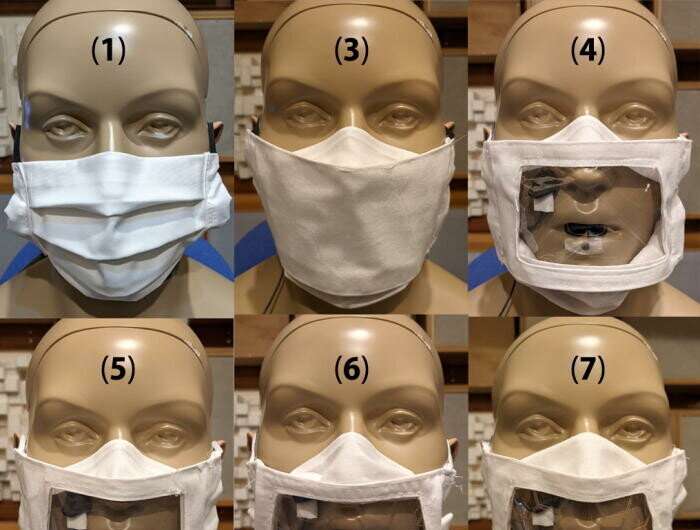Speech-friendly face mask could end frustration of muffled chat

A new face mask designed by Manchester researchers is promising to end the stress and anxiety talkers and listeners experience when they cover up.
Designed by a team at The Universities of Manchester and Salford, and the National Institute for Health and Care Research (NIHR) Manchester Biomedical Research Center (BRC), the revolutionary design will protect wearers from viruses such as COVID-19.
The need for safe and effective covering remains important to protect wearers and bystanders for some groups. This can include elderly people or those who are are immunosuppressed (have a weakened immune system).
A study by Dr. Gaby Saunders, Senior Research Fellow at the University of Manchester, showed how opaque masks were associated with anxiety and stress in both the talker and the listener, spurring the project.
Dr. Saunders, who manages Manchester BRC's Hearing Device Center, said: "Facial expressions are used extensively in communication, even among hearing people, and our research showed how face mask wearers feel less connected, less willing to engage in conversation.
"That is linked to increased anxiety and stress, as well as fatigue, frustration and embarrassment in both the listener and speaker."
A 12-month "rapid-response" grant from UK Research and Innovation (UKRI) allowed research audiologists at The University of Manchester, Dr. Michael Stone, Marston Senior Research Fellow, and Professor Kevin Munro, Honorary Consultant Clinical Scientist at Manchester University NHS Foundation Trust (MFT), to assemble a team of experts.
Dr. Stone, who is also Manchester BRC Developing Engineering Solutions Program Lead, consulted with members of the Deaf community and people with experience of hearing loss.
Feedback from the community, and other users, allowed the team to refine the design, which was validated in a recent paper in The Journal of the Acoustical Society of America.
Professor Trevor Cox, from the acoustics research center at the University of Salford, and the Maker Space team, also based there, developed a re-usable cotton-based mask design, allowing it to be manufactured widely.
The design incorporates an optically transparent panel, supported on a thin "scaffold," which produces less muffling of sound than a conventional opaque mask with the acoustic signal (sound) from the mouth.
Prof Cox said: "By reducing the weight of the transparent plastic, we could stop the high frequency parts of speech being lost in the mask. The scaffold to support the thin plastic sheet is carefully designed not to hinder the sound."
Dr. Stone said: "This is a brilliant linking up of two diverse academic pursuits, psychology and physics, to produce real-world benefit for a wide range of people. The optical panel has also been shown to be effective in face visors, and we are now looking for commercial partners so as to extend the reach of the designs and prototypes as well as incorporating a novel lightweight filtration material developed at the University of Manchester."
More information: Trevor J. Cox et al, Improving the measurement and acoustic performance of transparent face masks and shields, The Journal of the Acoustical Society of America (2022). DOI: 10.1121/10.0010384
Gabrielle H. Saunders et al, Impacts of face coverings on communication: an indirect impact of COVID-19, International Journal of Audiology (2020). DOI: 10.1080/14992027.2020.1851401





















